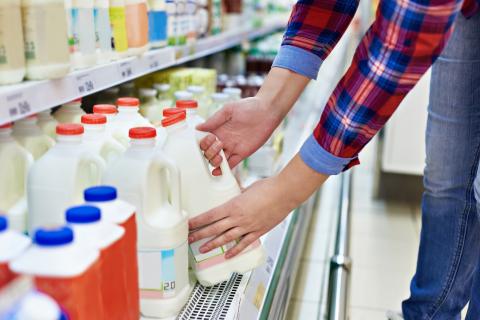5 Tips for Feeding Your Family Through Quarantine: Tip #4 When to Save or Throw Out Food

Now that we are months into the stay-at-home order, do you wonder how long the food you stocked up on will last? Have you found yourself looking at something from your cupboard and wondering if it is still safe to eat? All packaged food has some sort of labeling that tells you when the food needs to be sold by, used by or if it’s expired. Let us look at the product labels and see what they mean for you.
Sell-By Date
The “Sell-By” date indicates the last day the product can be sold by the store. When purchasing food that you want to last, double check the Sell-By date to be sure the food is not too close to this date. The Sell-By date is not an indicator of safety.
Do not be too hasty with throwing out foods out that are past the Sell-By date; with proper storage, some foods can last several days to weeks past this date. For example, fresh pasteurized milk that is held under refrigeration at 40°F or below will last for a week past the Sell-By date before starting to sour. Opened cartons of milk generally should be used within 4-7 days.
Best-By/Use-By Date
The “Best-By/Use-By” date lets you know when the food is at its peak quality and is not an indicator of safety. Food may still taste good and be safe beyond the Use-By date and does not need to be thrown out.
Baby formula is the one exception. It is not safe to feed your baby formula once it has passed the Use-By or expiration date and it should be thrown out. Nutritional value, so important for healthy infant development, is the reasoning behind this guideline.
Many people purchase staples and canned foods because they have a relatively long shelf life. Try to buy what you can expect to use within the time recommended. Foods stored for longer than recommended times or beyond the date on the package may change quality, color and flavor.
Freeze-By Date
The "Freeze-By" date indicates when a product should be frozen to maintain peak quality and is not a purchase or safety date. Freezer storage is for quality only. Frozen foods remain safe indefinitely. Freezers need to be maintained at 0°F or below. If freezing meat and poultry in its original package longer than two months, overwrap these packages with airtight, heavy-duty foil, plastic wrap or freezer paper, or place the package inside a plastic bag.
So how long will the packages of chicken you purchased in bulk last? Whole poultry can be stored for up to 12 months and maintain peak quality, whereas chicken breasts will keep quality for nine months. Cooked, plain chicken is best used within four months.
Expiration Date
The “Expiration Date” does indicate that the food should not be consumed after the date because it may not be safe.
Safe Food Storage
While understanding product dating is important, properly storing foods is very important to preserve food quality and prevent both spoilage and foodborne illness.
A product should be safe and wholesome if handled properly until the time spoilage is evident regardless of what the date on the package states. For example, if your refrigerator thermometer reads 45°F rather than 40°F or below, food will spoil at a much quicker rate. Spoiled foods will develop an off-odor, flavor or texture due to naturally occurring spoilage bacteria. If a food has developed such spoilage characteristics, it should not be eaten.
For more from the 5 Tips for Feeding Your Family Through Quarantine series
Tip #2 Prevent the Spread While Shopping
4 Steps to Food Safety, FoodSafety.gov
Cold Food Storage Chart, United States Department of Agriculture
FoodKeeper App, FoodSafety.gov, U.S. Department of Health and Human Services
Food Storage, Nebraska Extension
Food Storage for Safety and Quality, The University of Georgia Cooperative Extension
Food Storage Guide, North Dakota State University Extension Service
How long can you keep dairy products like yogurt, milk, and cheese in the refrigerator? United States Department of Agriculture (USDA)
Refrigeration and Food Safety, United States Department of Agriculture (USDA)
Refrigerator and Freezer Storage Chart, Food and Drug Administration (FDA)

